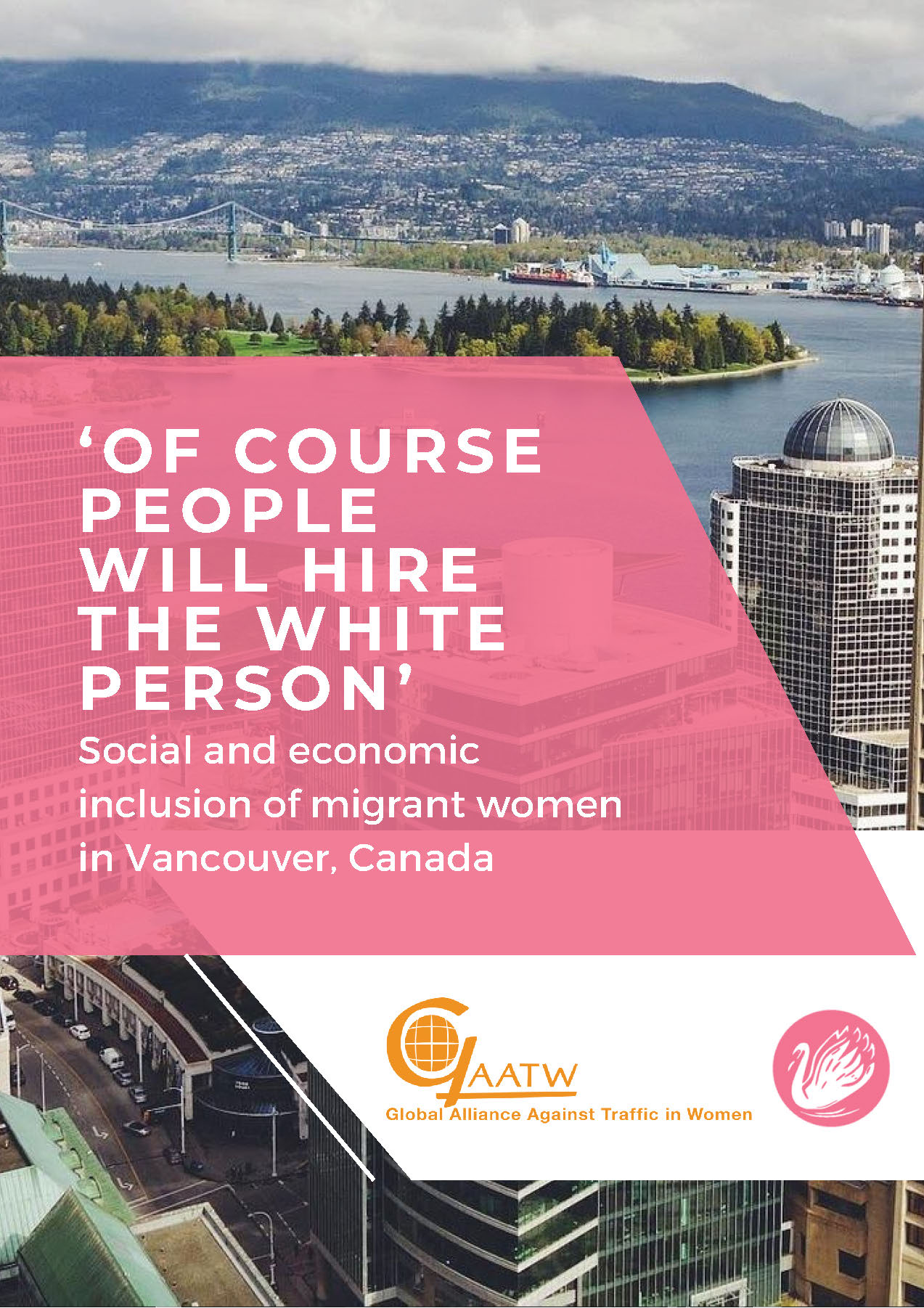
‘Of Course People Will Hire the White Person’: Social and economic inclusion of migrant women in Vancouver, Canada
This report presents the findings of a research into the experiences of migrant women in Vancouver, Canada, with accessing the labour market and integrating into Canadian society. Women shared that their limited ability to speak English and the fact that their education and work experience from their home countries were not recognised in Canada were major obstacles to finding good employment. Several also shared experiences of racism or discrimination, including for seemingly minor reasons such as being unaccustomed to having small talk with customers. All this meant that migrant women often could rely only on their co-nationals for work, accommodation, and socialisation, which increased the risks of being subjected to exploitative working conditions. Overall, however, women tended to perceive Canadian society as just and fair and blame themselves for any difficult situations they faced.
The research was conducted in 2020-2021 by GAATW member SWAN, a community organisation for im/migrant sex workers in Vancouver. It involved thirty women from China, Chinese Taipei (the island of Taiwan), Chile, Mexico, Guatemala, India, and Iran.
Read the report here.
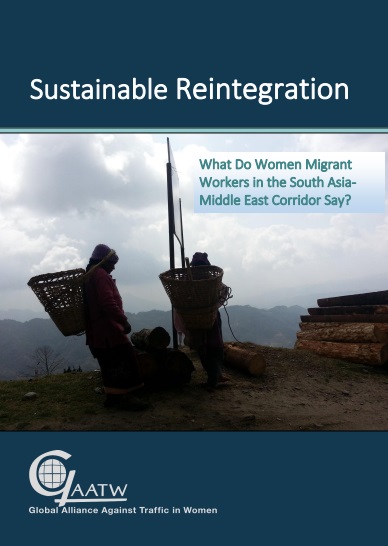
Sustainable Reintegration – What Do Women Migrant Workers in the South Asia-Middle East Corridor Say?
The aim of this report is to highlight the challenges that women migrant workers from South Asia who returned from the Middle East experience when trying to resume their lives upon return. It highlights gaps in the implementation of policies and programmes for sustainable reintegration of migrants. It identifies opportunities for improvement based on migrant women’s own desires and ambitions, as well as the work of civil society organisations working with them.
The report is based on research conducted between July 2020 and March 2021 with 486 returnee migrant women from Bangladesh, India, Nepal, and Sri Lanka. Most had worked as domestic workers in Kuwait, UAE, Oman, Bahrain, Qatar, Saudi Arabia, and Lebanon for between several months and several decades. The research employed participatory methods and explored women’s experiences with return, work and income upon return, access to government programmes, and relationships within the family and community.
Read the report here.
Read Policy Briefing: Women migrant workers are building our countries’ futures
.pdf - Adobe Acrobat Pro 2_8_2021 4_36_32 PM.png)
Empowering domestic workers by unpacking the forces that disempower their everyday life
Critical literacy is fundamental in the fight for social justice. In mapping the education tools available for women in low wage and informal work, the Global Alliance Against Traffic in Women, Asia Floor Wage Alliance, and International Domestic Workers Federation identified a gap in linking women’s work at home and in the workplace with the larger (and rising) global inequities. While there are many trainings on collective bargaining, worker organising, and gender-based violence in the workplace, women’s struggles for labour rights require deeper exploration. There is a need to ask how capitalism and patriarchy control women’s bodies and agency throughout their lifetime. There is a need to connect the socioeconomic invisibility of women’s work to the bigger goal of securing rights for ALL workers.
Narrative for Domestic Workers (written and developed by Self Employed Women's Association, India) and Buku Pegangan Pendidikan Politik Pekerja Rumah Tangga (written and developed by JALA PRT, Indonesia) aim to contribute to the political education of women domestic workers from India and Indonesia. The country-specific training tools are designed to be taken up by the women’s groups one at a time, with emphasis on learning through discussions and reflection. The handbooks tackle a range of obstacles to women’s advancement and participation in public life: gendered division of labour; reproductive labour and unpaid care work; domestic violence; discrimination on the basis of gender, class, caste, and ethnicity; and exploitation.
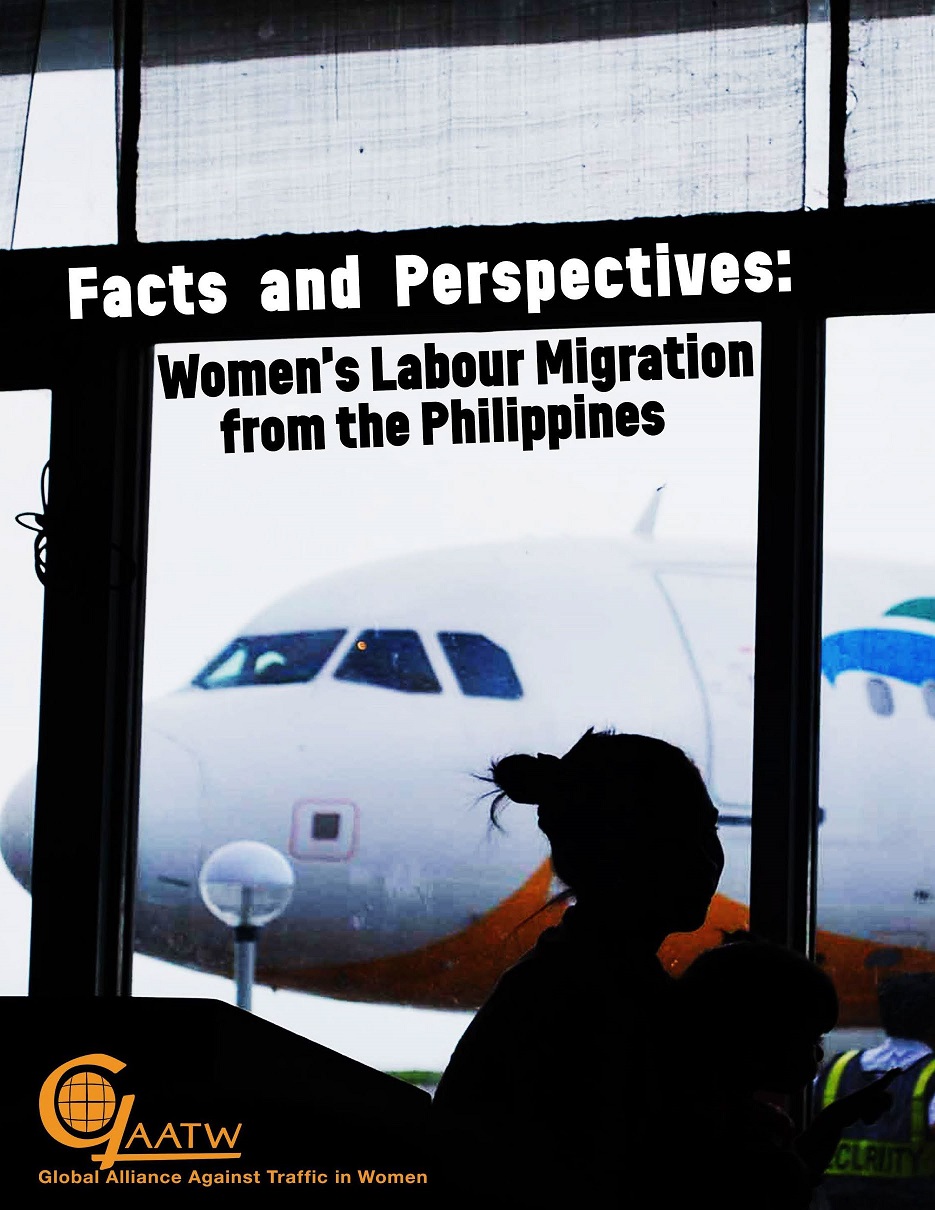
Facts and Perspectives: Women's Labour Migration from the Philippines
This report presents findings from a small-scale research that aimed to understand the perspectives and attitudes of women migrant workers from the Philippines on return and reintegration. It shows that women's decision to return is not straightforward, with many factors playing a role, such as the availability of savings, children's wellbeing, other family members' expectations, and the overall feeling of success from the migration experience. The report also provides an overview of the Philippine government policies for migrant workers, including those on return and reintegration.
Read the report here.
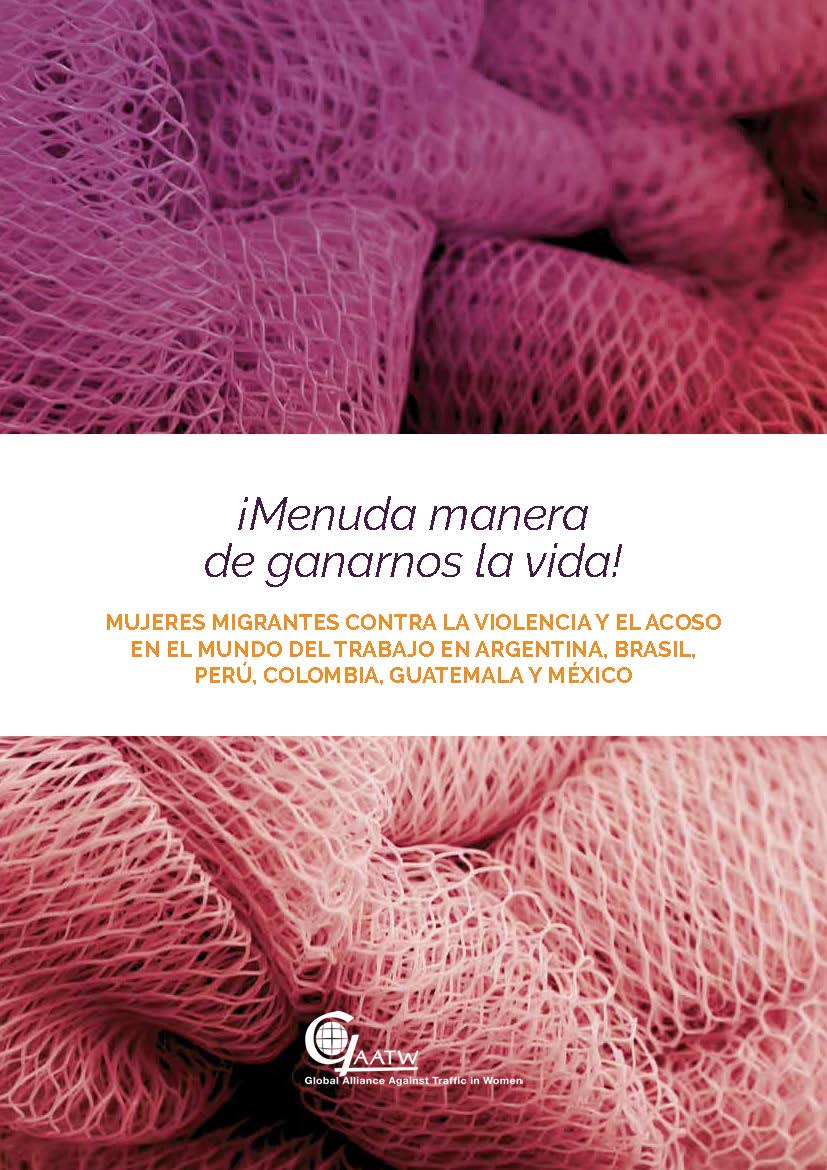
What a Way to Make a Living: Violence and harassment faced by women migrant workers in Argentina, Brazil, Peru, Colombia, Guatemala and Mexico
This research aimed to explore gender-based violence in the world of work from the perspective of women migrant workers. The 172 women interviewed by eight Latin American civil society organisations reported experiencing a spectrum of violence and discrimination, through dynamics created by patriarchal societies and families, racism and xenophobia and an entrenched neoliberal capitalist economy. This is creating a ‘new normal’ of permanent precarity through a lack of social coverage, poverty wages, exploitative working conditions and job insecurity.
View/download the reports:
Country reports (in Spanish)
La industria de la moda en Sao Paulo (ASBRAD, Brazil)
Colombianas y Venezolanas en el sector del servicio doméstico (SINTRASEDOM, Colombia)
Migrantes internas de Jalapa y Chimaltenango trabajando en sectores informales (ECPAT, Guatemala)
Venezolanas viviendo y trabajando en Lima, Perú (CHS Alternativo, Peru)
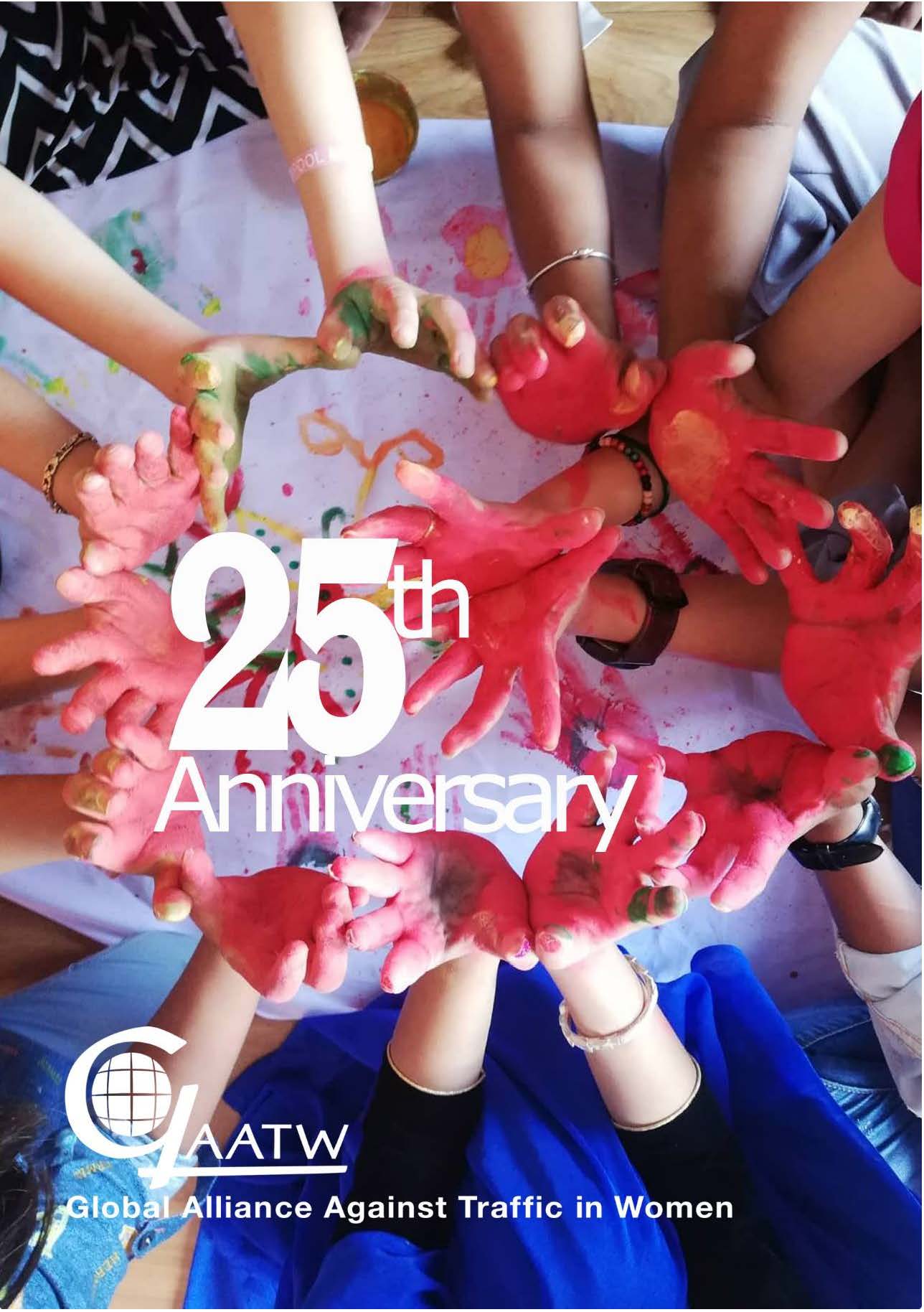
25 Reflections for GAATW's 25th Anniversary
The Global Alliance Against Traffic in Women (GAATW) was founded in 1994 by a group of feminists engaged in the international activism around violence against women and women’s human rights. Since then, the Alliance has grown to a membership of more than 80 NGOs worldwide and has established itself as a leading voice for the protection of the rights of migrant and trafficked women. (See more about our history here.) This year, in 2019, the Alliance celebrated its 25th anniversary.
In this publication, 25 close allies of GAATW - Board members, former staff, representatives of member and partner NGOs and independent experts - share memories about their engagement with the Alliance, as well as reflections on past and recent developments in the migrant rights and anti-trafficking fields over the last 25 years.
Read the collection of these reflections here.
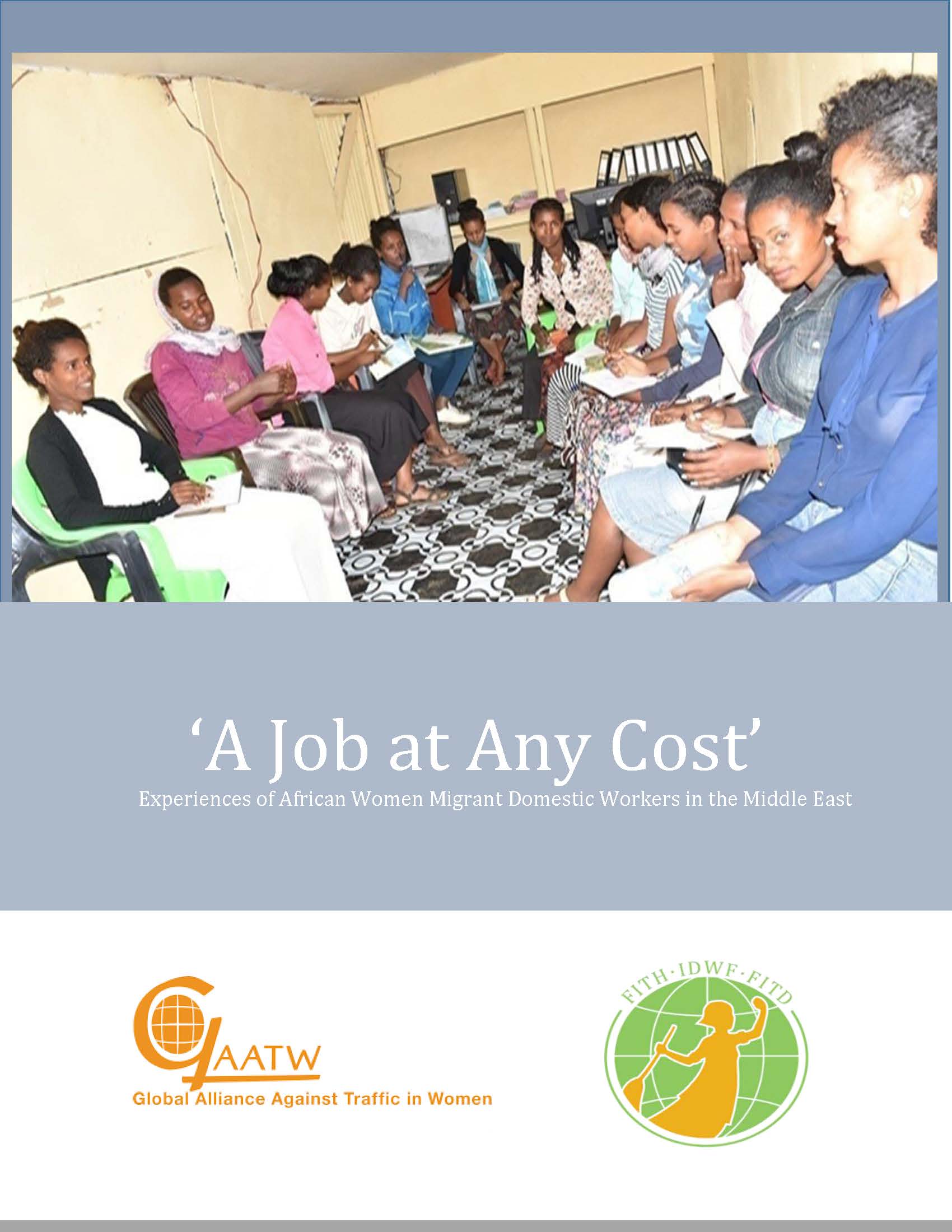
‘A Job at Any Cost’: Experiences of African Women Migrant Domestic Workers in the Middle East
To gain a better understanding on the trends, processes, challenges and opportunities around the migration of African women to the Middle East for domestic work, the International Domestic Workers Federation (IDWF) and the Global Alliance Against Traffic in Women (GAATW) condcuted research among prospective, current and returnee migrant domestic workers from six African countries. Other interviewees included members of the women's families, government officials responsible for labour migration, private recruitment agencies, and NGOs and trade unions working with migrant domestic workers.
Across the six locations, the research found that lack of economic opportunities and decent jobs are the main reason why an increasing number of women migrate to the Middle East for domestic work. At the same time, the regulatory, institutional and policy frameworks are lagging behind this trend and failing to ensure the safe migration and human rights of migrant domestic workers. Most of the women who participated in the research saw their migration bottom line as generally positive: their overseas work had allowed them to suppor their families, buy a piece of land, or start a small businesses. However, the vast majority had also faced various hardships, such as deception by recruiters, long working hours with little rest, physical, emotional and sexual abuse, underpayment or non-payment of wages, health problems, and others.
View/download:
Tanzania and Zanzibar country report
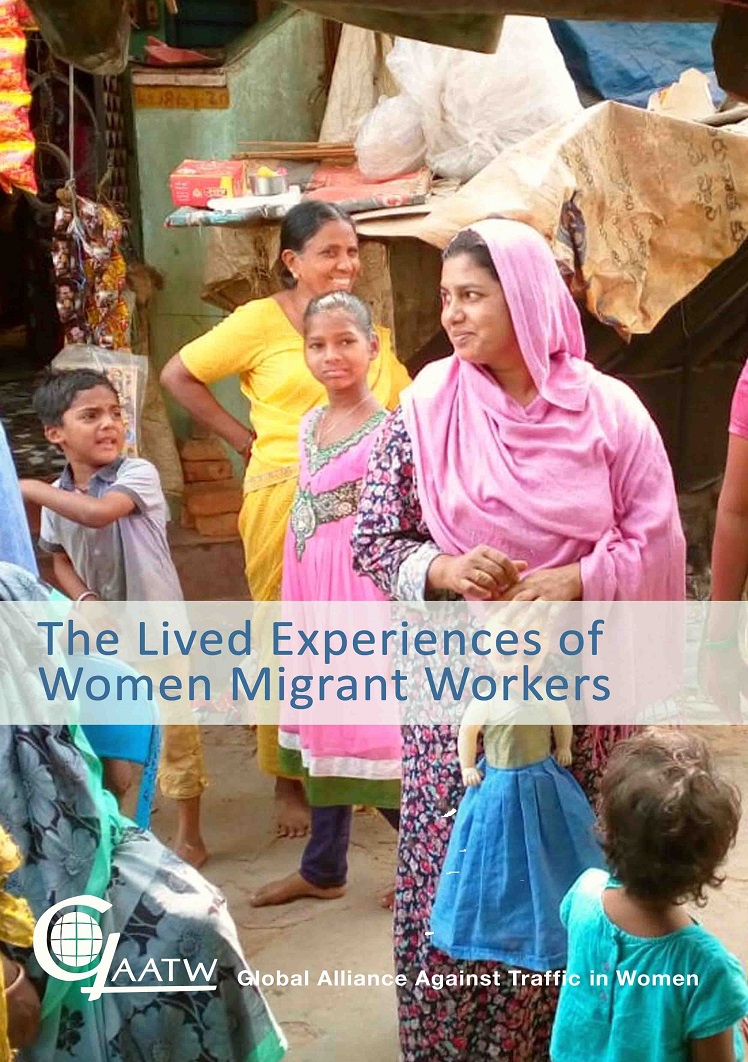
Learning from the Lived Experiences of Women Migrant Workers
In 2018, the International Secretariat of the Global Alliance Against Traffic in Women (GAATW-IS) worked with partners in nine migrant-sending and receiving countries to document the lived experiences of women workers with regard to their migration . The research went beyong taking note of the forms and levels of violence that women migrant workers faced: it took a close look at the structural inequalities embedded into the current migration regime that allow such violence to persist.
This Report draws on the findings of a feminist participatory action research (FPAR), through which project partners spoke with 214 women migrant workers across the nine countries. Most of the women came from Bangladesh, Ethiopia, India, Nepal and Sri Lanka, and a smaller number from Benin, Guinea and the Philippines. For most, the Gulf Cooperation Countries (GCC), Lebanon and Jordan were the main destinations.
